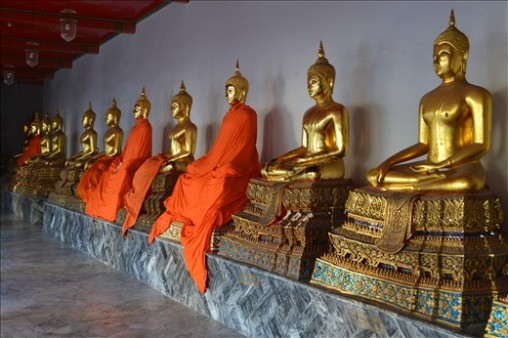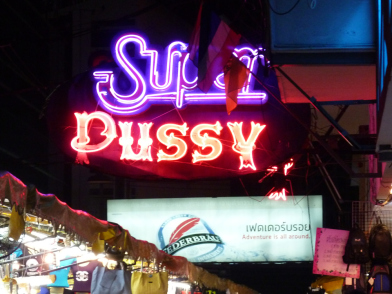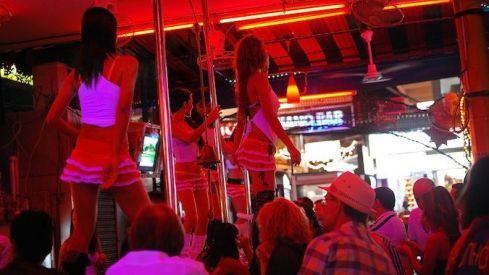It’s now been 4 years since I start traveling during my summer holidays at University to travel the world. Aldous Huxley says, to travel is to discover that everyone is wrong about other countries.
November 2013 was my first time in Thailand. I can still remember the first time I heard about Thailand. I was around 15 and my friend told me about Hard Copy. It was one of those late afternoon “news” shows in the 1990s that focused on “hard” hitting journalism. Hard Copy was doing an exposé on sex tourism in Thailand. The program showcased the Marines and old men who came to Thailand to buy the services of young, sometimes under-age girls (and boys).
November was ugly in my part of Bangkok. I stay near Soi Nana, off Sukhumvit Road, a famous tourist site catering for a specific sort of visitor: middle-aged western men. They come to Nana for one reason—to have sex cheaply. November to January is high season in Thailand for holiday makers from northern nations, and the bars and pavements of Nana are packed with hundreds of people buying and selling sex. November was busier than ever that year. It took a struggle every evening to get through the ranks of skinny Thai women and the pale men in shorts picking them over.
Gladly, I wasn’t a solo traveler at that time, I have Pattamon (Boo) my Thai friend who I met at The International Youth Conference ASEAN Community in Jakarta, she was representing Thailand at the program and it just two weeks before I came to Thailand.
Shortly, we were outside the hotel to get some local foods around 10pm.
And, wait! Why so many Brits? What are these men doing in Thailand? I asked Boo, So these extra men are coming here for sex? “It’s that, or the golf,” said Boo.
She thought that the backpacker tourists might account for the gap—young British males, following the traditional trail through southeast Asia to see mates or relatives in Australasia. But the average British arrival is aged 40, I pointed out. “Backpacking is a state of mind, not an age thing,” pronounced Boo. That’s an advertising slogan, not an explanation, I said.
She became tetchy. “Look, if you are really researching the social factors of this, you should consider if men might come here because they’re fed up with the ball-breaking females they have to deal with at home. Maybe they want to meet the sort of gentle, beautiful, kind-hearted women they’ll find here.” This seemed to answer my question. The men are here for sex and, of course, golf. Or both. Female golf caddies who double as prostitutes are, anecdotally, one of the special features of the courses of Thailand.
So what drives sex tourism in Thailand?
Many studies have been carried out to identify the reasons that drive sex tourism in Thailand. Many explanations have been pointed out like the poverty, the government policies, the demand from the tourists, the cultural perception, and in addition the low cost and the unique services that they can provide the customers.
Firstly, the poverty, one of the major problems in Thailand, except for the big cities, many rural area and un-development districts are very poor. Added to it, they do not plan birth control, so many poor families have 4 to 5 children which just make their situation worse. Many are struggling to find a way to support their family. Alternatively, in another case, where the family is in debt and they are threatened to pay for it or they fail their agriculture or farm work and they need money to cover for it. Many parents have sold their children to pay for the debt. So when the agents tactfully approach the families, most of the family would trade their daughter for money and let them become sex workers. Not only that, many married women who then become widowed or left by their husbands and have their children to take care of, they do not have much options. It also includes many young girls that fed up of living in a life with no future; they are willing to trade everything for a better life. Many of them are exposed through television how a luxury easy life should be, the feeling of being rich, the ability to buy expensive beautiful things. And then they get influenced by their friends or follow the lead of the oldest among them, believing by becoming a prostitute they could change and become rich. Moreover, for them, foreigners equal to money, a gateway for a better life and a ticket to over-sea where they can experience what they deserve. Whether they are on business or leisure most of the time they could pay more than the average local clients or if the girl is lucky they could become their lover and have a better life. For the girls, becoming a prostitute for them is one of the easiest options to achieve what they want.
Then, the cultural perception, from long ago, Thai convinced that in the family the oldest daughter supposes to support the family by earning money, the second help the family by doing the chores, taking care of the family and the younger one receives the education. So in most Thai families, the oldest one is often encourage going to bigger city to find job to support the family. There is also Thai society placed on virginity, which is meant to be preserved for one’s husband. However, the belief is backfired, for instance, among rape cases; after the girls lose their virginity they think they do not have any value anymore, so the only choice left for them is to become a sex worker.
Thirdly, the demand, mainly the demand for sex tourism and child sex tourism is from male customers, especially from wealthy, developed nations and the fact that commercial sex is considered a male right in a male dominant commodity culture; contribute a lot to this demand. Even though, the majority of sex tourists are male but there are still female who travel for sex and child sex tourism. It also makes prostitution in Thailand is much bigger than just the trade for tourists. There is no official measurement of the economics, but the clues are there. Many Thai men are habitual users of prostitutes, and the trade, while illegal, carries less stigma than in most countries and is acknowledged by the government as a source of revenue.
I did remember a group of Australian men said that Thailand is known for providing good services with reasonable price. In addition, Western men are often attracted to Asian women’s characteristics, for instance, their hair, the features, the way they talk or their graceful movements. Besides that, the nature of services is different too, for example, for them, sexual services are usually bought the same way as normal commercial goods, both parties agree on the price for a specific task, and then the services will be delivered. After the service, they do not longer expect the prostitute to cuddle or act as their lover after sex but leave them after it. But compare to Asian women, some of them even cook, clean their room for the customers after the service and do not ask for extra money. They like the way they are treated by Asian women. Therefore, the demand from the tourists will keep increase and not decrease.
Thing that Boo always warn me to remember is in Thailand, prostitution is illegal — but everyone turns a blind eye.
I look at the prostitution in Thailand through Western eyes. I think that if there is an old man and young women there must be exploitation going on and that these naïve girls are just being taken advantage of. We all want to come and rescue these girls from their lives.
But that’s because in the West they equate sex with love and view prostitutes as dirty. However, Thailand has a very different notion of sex and love.
Sex in Thailand involves a huge set of contradictory values. Thailand is a very conservative culture. On the one hand, prostitutes are generally considered lower class and the profession is looked down upon. On the other, Thai men frequent prostitutes and, despite the conservative nature of Thailand, this behavior is tolerated.
And this is an often overlooked fact – the vast majority of sex tourism in Thailand comes from locals. Western sex tourism pales in comparison to this massive industry. The difference between Thais and Westerners? Thais are much more discreet.
In Thailand, prostitution is a job and prostitutes are simply workers. Sure, in Thailand’s highly classed social structure “good Thais” would never have a daughter who was a hooker, nor would a good Thai boy marry one.
But compared to the West where they really look down at prostitutes, in Thailand the social stigma is not as great. Thais walk by prostitutes the way we walk past everyone else. During the day, the same girls you saw shaking it will be walking down the street covered up.
In fact, most of the prostitutes tend to have Thai boyfriends or husbands. Why? Because it’s just the girl’s job. It’s a job that brings in a lot of money and the Thai boyfriend doesn’t care. Work is separate from everyday life.
Thais don’t equate sex with love like people do in the West; relationships aren’t just about love. They are more complex than that. In the west, we always ask “do you love him?” as if that is all that matters. If you came home and told your parents you loved a garbage man, would they be happy? Maybe not, but “if you loved him” then that’s all that would matter. Love will find a way.
My point is that if I look at prostitution in Thailand through the Western values and morals and declare that these innocent girls are being exploited by old men and need to be saved. And while anyone forced into prostitution should be saved, for the girls who come and consent – what are we saving them from? A life we don’t want them to lead? Are we just quieting our conscience? Or are we just grossed-out because everything is so open and we would rather these dark aspects of humanity were kept behind closed doors? Maybe the real problem is we just don’t want to know it exists.
You don’t have to agree with prostitution. I am not going to visit a prostitute, too! and I think a 50-year-old and an 18-year-old together is disgusting but if it doesn’t bother them, it doesn’t bother me.
Is the situation gross? To me, Yes. Is what you see exploitation? Not really. Is it really any of my business? No.
The next time you are in Thailand, don’t be so quick to judge. We travel to learn about other cultures – so don’t be shocked when other cultures have different attitudes about things like sex and prostitution.
Furthermore, Thailand is known as the “Land of Smile”, ‘It’s not just the sex industry’ – reasons why Bangkok’s on the up. Great entertainment, shopping and food – fans of the newly crowned most visited city in the world say there are many attractions beyond its sleazy reputation.
But, travelling to Thailand for sex will continue. The brand is established. What can you do? Join me, be a responsibe traveler #traveldonttrafic
Agita Pasaribu is a twenty-something year old Indonesian with the issue of not being able to stay in one place, been traveling abroad since 2012. Graduating in Bachelor’s degree in Law.
This post dedicated to: World Tourism Day


